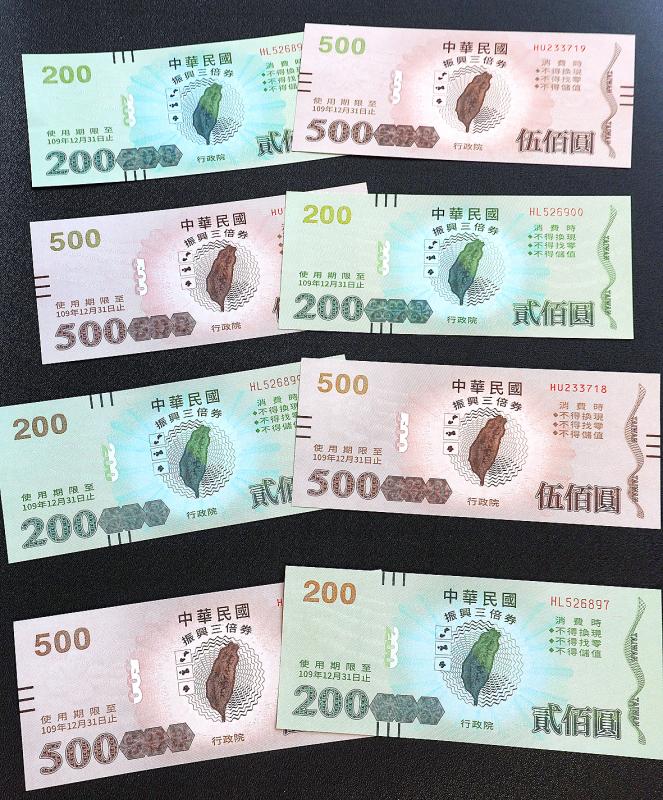A stimulus voucher program and coupon packages introduced by the Executive Yuan and other government agencies to bolster the economy have nearly tripled business revenue, the Ministry of Economic Affairs said yesterday.
Ministry officials presented the figures in a report to Premier Su Tseng-chang (蘇貞昌) at a weekly meeting of the Executive Yuan.
Su was told that the NT$65.055 billion (US$2.25 billion) spent for the Executive Yuan to issue the Triple Stimulus Vouchers and for agencies to issue coupons generated an estimated NT$179 billion in business revenue, boosting the economy amid the COVID-19 pandemic.

Photo: David Chang, EPA-EFE
The Ministry of Transportation and Communications, the Council of Agriculture, the Sports Administration, the Ministry of Culture and the Hakka Affairs Council issued their own coupons.
To boost consumer spending, people were encouraged to buy NT$3,000 of vouchers for NT$1,000.
Regardless of age or income level, all 23 million Taiwanese, as well as 150,000 foreign and Chinese spouses holding residency permits, were eligible to purchase paper or electronic vouchers.
As of Tuesday, 22.89 million people had bought the vouchers, or 96 percent of those eligible, Small and Medium Enterprise Administration Director-General Ho Chin-tsang (何晉滄) told reporters after the meeting.
About 21.09 million people selected the paper stimulus vouchers, while 1.8 million chose electronic vouchers, with only 910,000 people still needing to collect their stimulus vouchers, Ho said.
The buying spree triggered by the vouchers has been reflected in business revenue and government tax income, as seen by the growth in July retail sales, ending a five-month contraction, he said.
Taiwan’s retail sales in August and last month set historical single-month highs, as did the restaurant and beverage sector last month, Ho added.

STEEP DECLINE: Yesterday’s drop was the third-steepest in its history, the steepest being Monday’s drop in the wake of the tariff announcement on Wednesday last week Taiwanese stocks continued their heavy sell-off yesterday, as concerns over US tariffs and unwinding of leveraged bets weighed on the market. The benchmark TAIEX plunged 1,068.19 points, or 5.79 percent, to 17,391.76, notching the biggest drop among Asian peers as it hit a 15-month low. The decline came even after the government on late Tuesday authorized the NT$500 billion (US$15.2 billion) National Stabilization Fund (國安基金) to step in to buoy the market amid investors’ worries over tariffs imposed by US President Donald Trump. Yesterday’s decline was the third-steepest in its history, trailing only the declines of 2,065.87 points on Monday and

TAKING STOCK: A Taiwanese cookware firm in Vietnam urged customers to assess inventory or place orders early so shipments can reach the US while tariffs are paused Taiwanese businesses in Vietnam are exploring alternatives after the White House imposed a 46 percent import duty on Vietnamese goods, following US President Donald Trump’s announcement of “reciprocal” tariffs on the US’ trading partners. Lo Shih-liang (羅世良), chairman of Brico Industry Co (裕茂工業), a Taiwanese company that manufactures cast iron cookware and stove components in Vietnam, said that more than 40 percent of his business was tied to the US market, describing the constant US policy shifts as an emotional roller coaster. “I work during the day and stay up all night watching the news. I’ve been following US news until 3am

Six years ago, LVMH’s billionaire CEO Bernard Arnault and US President Donald Trump cut the blue ribbon on a factory in rural Texas that would make designer handbags for Louis Vuitton, one of the world’s best-known luxury brands. However, since the high-profile opening, the factory has faced a host of problems limiting production, 11 former Louis Vuitton employees said. The site has consistently ranked among the worst-performing for Louis Vuitton globally, “significantly” underperforming other facilities, said three former Louis Vuitton workers and a senior industry source, who cited internal rankings shared with staff. The plant’s problems — which have not

TARIFF CONCERNS: The chipmaker cited global uncertainty from US tariffs and a weakening economic outlook, but said its Singapore expansion remains on track Vanguard International Semiconductor Corp (世界先進), a foundry service provider specializing in producing power management and display driver chips, yesterday withdrew its full-year revenue projection of moderate growth for this year, as escalating US tariff tensions raised uncertainty and concern about a potential economic recession. The Hsinchu-based chipmaker in February said revenues this year would grow mildly from last year based on improving supply chain inventory levels and market demand. At the time, it also anticipated gradual quarter revenue growth. However, the US’ sweeping tariff policy has upended the industry’s supply chains and weakened economic prospects for the world economy, it said. “Now